A Plan To Get Rid Of All Cats
Dr. Gareth Morgan, Cats To Go
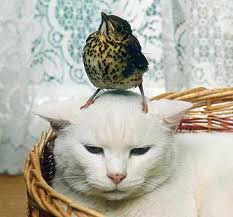 If New Zealand businessman Gareth Morgan has his druthers, it could all be over for Fluffy and pals. The economist and environmental proponent wants to see his country rid of pets that pose a danger to native birds, namely cats.
If New Zealand businessman Gareth Morgan has his druthers, it could all be over for Fluffy and pals. The economist and environmental proponent wants to see his country rid of pets that pose a danger to native birds, namely cats.
New Zealand plays home to an enormous array of native birds species, and the island nation's human inhabitants have the highest cat ownership rate in the world: 28% of households have one cat; another 20% have two or more.
New Zealand's native fauna is predominantly "walking birds." That means they don't fly. Gareth states that New Zealand originally had no predators, but about 150 years ago, the settlors introduced many predators, whose numbers have been increasing. He mentions a recent visit to China, which he states has been ruined with poor air quality and ruined forests. He knows that New Zealand has an amazing asset that they need to enhance and not let it go the same way as China.
So does Gareth think that all cats should be euthanized? He says his feelings can be summed up in a couple of slogans, "Every cat is a wanted cat," or "A confined cat is a pet, otherwise they're a pest!" So, his target is the cats that are allowed to wander and hunt. These include both feral cats and even domestic cats that are allowed to wander off their property and hunt on other people's property. His argument is that the cats that aren't owned should be trapped and humanely euthanized. He states that they do this with dogs, so why not with cats, who are causing so much damage. As far as domestic cats, and he states for the record his family has a cat, that if they should get caught wandering and have a microchip, they should be returned to the owner with a fine if the authorities feel it is appropriate. His bottom line is that all cats should be contained.
But what if you get rid of all the cats, doesn't that lead to a rodent problem? Gareth's defense is that he doesn't believe we should get rid of all the cats, just the wandering ones. If there are mice and other rodents in and around homes, then the domestic cats can take care of the problem. In terms of rodents in public areas, he states that there are already in place lots of techniques to get rid of those. These include poisons and an invention that some people might have heard of called the "mouse trap." He goes on further to state that we are not relying on cats to take care of the rodent problem as it is.
When asked about eradicating humans that have done more damage to eco-systems than cats alone, Gareth says he hears this statement quite frequently and believes that this is an argument trying to distract from the point.
 Gareth has written books on climate change and the defamation of fisheries around the world, so his issue about cats is not to the exclusion of any other efforts to enhance our environment and to curb the damage by human beings. He goes on to state that this particular issue is due to human beings, in that they are the one who originally introduced cats to New Zealand. So when asked why he is interfering with nature, he says there is nothing natural about breeding cats in great numbers in domestic environments and then letting them loose into the wild. That is actually a human endeavor.
Gareth has written books on climate change and the defamation of fisheries around the world, so his issue about cats is not to the exclusion of any other efforts to enhance our environment and to curb the damage by human beings. He goes on to state that this particular issue is due to human beings, in that they are the one who originally introduced cats to New Zealand. So when asked why he is interfering with nature, he says there is nothing natural about breeding cats in great numbers in domestic environments and then letting them loose into the wild. That is actually a human endeavor.
So how do you prove that cats are killing these birds? Gareth says that while every killed bird is not blamed on a cat, you can tell if a feral cat has killed any birds by doing an autopsy. Gareth also states that the statistics show that domestic cats bring home 20% of what they kill; leave 50% to rot, because they don't kill to eat, they kill for the pleasure; and the other 30% they eat on the spot. Therefore, he states that cats are natural born killers, just like lions or tigers.
So, how is all of this siting with the people in New Zealand and around the world? Gareth states he is being contacted by both rational people as well as by "nut cases." He says this is typical with any issue. He likens it to taking on the gun lobby in the United States!
Gareth agrees on a happy medium in that cats should be kept contained. This is not only good for the birds, but good for the cats as well. You can keep the cats in your house or in your yard by using a netting to keep them contained. There are also catteries, an outdoor enclosure, which give your cat a chance to be outside, sit in the sun and smell fresh air all while being safely confined. Gareth states that research shows that a cat that's born inside and kept inside for its entire life, hates going outside. When a local cat expert challenged Gareth and stated Gareth would probably feel really bad about confining a cat indoors, which doesn't seem natural, Gareth replied that that was the expert's perspective and not necessarily the cat's perspective.
On the campaign section of Morgan's website, CatsToGo.com, you will find the statement "That little ball of fluff you own is a natural born killer," where you can vote. Since those cats are preying on the country's native birds, in many cases to the point of extinction, says Morgan, one or the other has to go. Morgan's voting cats, though he's aware that won't win him any popularity contests. At present, 72% of respondents are voting no to a poll on Morgan's site that asks the question "In the interest of protecting native species would you consider not replacing your cat with a new one when it dies?" What is your vote?
Common Pet Toxins In Your Home - You Probably Have Every Single One of Them!
Dr. Justine Lee, Pet Poison Helpline
 Dr. Justine Lee works at the Pet Poison Helpline and states that the most commons calls they receive are about the kitchen foods that we eat. You are obviously not going to get rid of your kitchen food, so you just have to make sure that you appropriately pet-proof your house.
Dr. Justine Lee works at the Pet Poison Helpline and states that the most commons calls they receive are about the kitchen foods that we eat. You are obviously not going to get rid of your kitchen food, so you just have to make sure that you appropriately pet-proof your house.
Most people aren't aware that of the top five poisons that dogs get into, three of them are food. These include grapes and raisons, sugar-free xylitol (found in most gums and mints) and chocolate.
You might have heard conflicting stories about chocolate being poisonous to dogs. However, it is the dose that makes the poison. Really everything is poisonous, including oxygen, water and salt. It is how much you get into. So if your dog eats a couple of chocolate chip cookies, it's not a big deal. But it is also size-dependent, depending on how big your dog is or if he has underlying heart problems. A shortcut for determining chocolate is the darker and more bitter the chocolate, the more dangerous it is, which is typical of most baking chocolates. Also, white chocolate is not a problem. So its no surprise that the busiest time for the Pet Poison Helpline is during the holidays, which are associated with chocolate.
The top three common poisons dogs get into are food items and the last two most common poisons are human medications. These include human NSAIDS (pain killers/anti-inflammatories). Not only do our dogs get into these medicines on their own, but we sometimes even give our dogs human medications, which should never be done!
Another type of pet poison is marijuana. Not only is it poison in a loose-leaf form, but also it is more dangerous when people make pot brownies or pot butter. This can lead to a double poisoning from the chocolate and the oil from the butter. This can be very dangerous, as most pet owners won't admit when their dog gets into marijuana. Dr. Justine Lee's says its very important that they know exactly what the dog ingested, and that they are not the police nor the DEA (Drug enforcement Agency), all they care about is treating the pet. So please be honest and own up to it so that your pet can be treated as soon as possible.
While all dogs are prone to getting into the wrong items, the most common breed that is called into the Pet Poison Helpline are Labradors, because they love to eat everything!
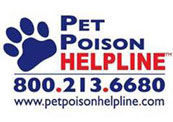 Dr. Lee states that you should have the Pet Poison Helpline programmed into your phone at 1-800-213-6680, as well as the number of your veterinarian and a pet emergency clinic. Also, if you suspect your dog has been poisoned, don't give them any milk, medications or food. Also, don't try to induce vomiting by using syrup of ipecac. Sometimes it can be more dangerous and make your pet sicker. In fact, even in human medicine, syrup of ipecac is no longer even recommended. When it doubt, get the poison away from your pet, get them out of the room, and the consult with an expert to see if inducing vomiting is appropriate in your case, with hydrogen peroxide. Unfortunately for cats, there is nothing you can give them to induce vomiting at home.
Dr. Lee states that you should have the Pet Poison Helpline programmed into your phone at 1-800-213-6680, as well as the number of your veterinarian and a pet emergency clinic. Also, if you suspect your dog has been poisoned, don't give them any milk, medications or food. Also, don't try to induce vomiting by using syrup of ipecac. Sometimes it can be more dangerous and make your pet sicker. In fact, even in human medicine, syrup of ipecac is no longer even recommended. When it doubt, get the poison away from your pet, get them out of the room, and the consult with an expert to see if inducing vomiting is appropriate in your case, with hydrogen peroxide. Unfortunately for cats, there is nothing you can give them to induce vomiting at home.
Dr. Justine Lee is Associate Director of Veterinary Services at Pet Poison Helpline, the author of two humorous books on cats and dogs, and a contributing editor to PetHealthNetwork.com, a fast-growing resource for pet-lovers and veterinarians.
http://www.drjustinelee.com
Dog Aggression
Peggy Swager, Training The Hard To Train Dog
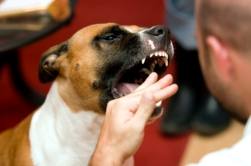 Peggy Swager is the author of "Training the Hard to Train Dog," and enjoys the challenge of training dogs that other people have had difficulty with.
Peggy Swager is the author of "Training the Hard to Train Dog," and enjoys the challenge of training dogs that other people have had difficulty with.
We speak to Peggy about dog aggression, which comes in many forms. Ironically, some people don't realize they are dealing with aggression issues when their beloved dog snaps at them over a bone or toy. Sometimes the problem is between two dogs in a household who begin to fight with each other.
Another type of aggression is from another dog. Perhaps you are out walking your dog when a stray dog confronts you. Peggy states you should watch the dog and his body language. Is he rushing at you? Are his hackles up? If you are walking a small dog, you should immediately pick him up. If you are walking a large dog, you need to stand in between your dog and the stray. When all else fails, you should always carry pepper spray. This will not harm the dog, but will give you a chance to leave the area. Plus, just carrying the spray will put you in a calm demeanor, which your dog will pick up on and also be more relaxed.
Another issue Peggy warns us about is what's called the "alpha-role." This is when you stand over a dog and roll it on its back and pin him to the ground to correct him. Peggy has known so many people who have tried to do this and have gotten bit as a result. Peggy has also seen where one dog alpha-rolled another dog, and this didn't work for the dogs either.
Dog owners need to learn what kinds of aggression they can handle, how to retrain the dog to resolve that issue, and when to call in professional help. Here is a link to a YouTube video that talks more about aggression and illustrates some of the techniques Peggy discusses.
http://www.peggyswager.com
The Dogfather's Grooming Tip with Joey Villani
 Anesthesia-Free Dentistry Offered By Groomers
Anesthesia-Free Dentistry Offered By Groomers
Joey tells us that a lot of groomers are now offering anesthesia-free dentistry in their salons. There are two ways that this is being offered.
One is an enzymatic cleanser, such as gels and sprays or additives for their water. Over time, these will remove the plaque. Groomers are starting this in their salons and then sending the product home with their clients to treat their pets. If you do this correctly and stay on top of it, these products work well and are safe to use. However, you are not going to get the professional dentistry look that you would get from your veterinarian. This is an alternative for those animals that can't be put under anesthesia for one reason or another, or for the pet parent who doesn't have the funds for a professional cleaning. However, you will get the best results if the teeth are professionally cleaned first, and then you follow up with these products on a regular basis.
 The other way is anesthesia–free dentistry, where the groomers are actually scaling the teeth. It is very unfortunate that the grooming industry is not licensed, because if it were, you would eliminate a lot of these problems. When you go in and scale the teeth of a dog that has a tremendous amount of tartar, a few things happen. Number one, dogs don't like it, and they are not going to let you do it very easily. This makes the whole process a negative process on the pet itself. This leaves a scar on their mind, and that any time someone looks at their teeth; they think this is going to happen again. Another thing, you don't know how the groomer's tools are disinfected or cleaned. A veterinarian is going to put his tools that an autoclave, sealed and opened just prior to the cleaning. The animal will also be sedated.
The other way is anesthesia–free dentistry, where the groomers are actually scaling the teeth. It is very unfortunate that the grooming industry is not licensed, because if it were, you would eliminate a lot of these problems. When you go in and scale the teeth of a dog that has a tremendous amount of tartar, a few things happen. Number one, dogs don't like it, and they are not going to let you do it very easily. This makes the whole process a negative process on the pet itself. This leaves a scar on their mind, and that any time someone looks at their teeth; they think this is going to happen again. Another thing, you don't know how the groomer's tools are disinfected or cleaned. A veterinarian is going to put his tools that an autoclave, sealed and opened just prior to the cleaning. The animal will also be sedated.
When you scrape a tooth, you are opening up the tooth enamel. This is like having open pores. So even though the teeth may now look good, everything that they now eat and drink gets sucked into the teeth like a sponge. In a short amount of time, all of a sudden you have this buildup that came back rapidly and a lot worse than it was before. Teeth need to be scaled and then polished, just like your own dentist would do to your teeth. In some cases, after scaling the teeth bacteria is loosened and may go into your pet's system. Your veterinarian may then want to put your pet on an antibiotic immediately following a teeth cleaning.
In most states, it is against the law for groomers to perform anesthesia-free dentistry. So, if you groomer offers to scale your pet's teeth, tell them. " No thank you! I will have my veterinarian take care of it."
Animal Radio® News with Stacey Cohen
 Library Gifts Covered in Poop
Library Gifts Covered in Poop
San Francisco puppies are getting an assist from the public library in their quest to become potty trained. With more people reading newspapers digitally, public contributions of newspaper to line cages at Animal Care and Control have gone down. The San Francisco Chronicle says the public library has intervened and will now donate all of the 2,000 newspapers it goes through every month. Animal Care says the library's ongoing gift will take care of all their newspaper needs for their, quote, "poop machines."
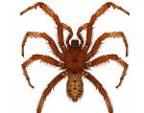 Penn and Teller Have Their Own Spider
Penn and Teller Have Their Own Spider
A longtime Las Vegas headliner now has a spider named after him. Jason Bond, with Alabama's Auburn University, has named a species of trapdoor spider for illusionist Penn Jillette. The rust-colored spider is native to the desert near Nevada's nuclear testing facility. In real life, the vocal half of Penn and Teller tells the "Review-Journal" he's likely to, quote, "scream like a little girl" at the sight of a spider.
 Iran Launches Monkey Into Space
Iran Launches Monkey Into Space
Iran said they launched a live monkey into space, seeking to show off missile systems that have alarmed the West because the technology could potentially be used to deliver a nuclear warhead. The Defense Ministry announced the launch as world powers sought to agree a date and venue with Iran for resuming talks to resolve a standoff with the West. Efforts to nail down a new meeting have failed repeatedly and the powers fear Iran is exploiting the diplomatic vacuum to hone the means to produce nuclear weapons. The Defense Ministry said the space launch of the monkey coincided with the days of the Prophet Mohammad's birthday, but gave no date, according to a statement carried by the official news agency IRNA. The launch was "another giant step" in space technology and biological research "which is the monopoly of a few countries", the statement said. The small grey monkey was pictured strapped into a padded seat and being loaded into the Kavoshgar rocket dubbed "Pishgam" (Pioneer) which state media said reached a height of more than 75 miles. "This shipment returned safely to Earth with the anticipated speed along with the live organism," Defense Minister Ahmad Vahidi told the semi-official Fars news agency. "The launch of Kavoshgar and its retrieval is the first step towards sending humans into space in the next phase." There was no independent confirmation of the launch.
 Banning Cats Forever
Banning Cats Forever
Economist Gareth Morgan is on a mission against one of America's favorite pets: the domesticated cat. Morgan wants ban cats from his native New Zealand, arguing that Fluffy and her feline cohorts are killing the country's native wildlife. His proposal is to neuter all the country's cats, then convince Kiwis to give up on buying or breeding replacement pets. That would mean no more kittens for New Zealand. To be sure, cats are a big threat to the native wildlife of New Zealand, Australia and other island countries. According to Morgan's campaign, Cats to Go, cats have contributed to the extinction of nine New Zealand bird species. "Like the parent of a bully saying that their little Johnny would not behave like that, if you're a cat owner reading this, you are probably thinking that the above statistics don't apply to your cat," Morgan wrote on his site. "The fact is that your furry friend is actually a friendly neighborhood serial killer." While that might seem like overkill to Americans, the fact is that domestic cats have caused fur to fly in the states as well. The American Bird Conservancy has its own campaign to keep cats from preying on our native animals. Rather than focusing on eliminating felines, the group urges cat owners to keep their pets indoors. Regardless of what happens in Morgan's battle in New Zealand, one thing's for sure: Americans aren't likely to give up their cats anytime soon. With about a third of all U.S. homes owning at least one cat, kitties are our favorite domestic animal.
 Virginia Is For Zebras?
Virginia Is For Zebras?
A teenage horse lover says the movie "Racing Stripes" inspired her to bring a zebra to her home in Roanoke, Virginia. Shea Inman tells The Roanoke Times she bought one of Africa's black and white members of the horse family three years ago and named him Joey. Inman's mother says her daughter has always been able to bond with horses others couldn't. And Racing Stripes, which tells the story of a former circus zebra's transformation into a racehorse in Kentucky, gave Shea the idea for a new challenge. So she did her research to make sure it's legal to own a zebra in Virginia, checked her funds, and then begged her parents to let her "give it a go." They agreed, and Shea definitely got to take up her challenge. Shea says Joey has been harder to train than any other horse she's ever worked with. She jokes that some days it feels like he's been ridden for 30 years, and others it seems like he's never seen a human being before.
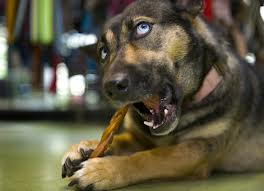 Bull Penis's Full Of Calories
Bull Penis's Full Of Calories
Turns out there's a lot more inside a popular dog treat than most pet owners probably imagine. They're called "pizzle" sticks or "bully" sticks and a new study out of Canada says they're loaded with calories and bacteria. The treat is made from uncooked, dried bull penis and researchers say they can contain things like E. coli and MRSA. Add to that, they pack enough calories to make up as much as 30 percent of a dog's recommended daily calorie intake. The study, published in the Canadian Veterinary Journal, concludes pet owners should consider such treats raw meat and always wash their hands after handling them.
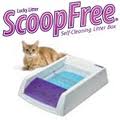
NEWS UPDATE Brought To You By ScoopFree.com. Free Shipping on trays plus up to $20 off your first subscription.
 Listen to the entire Podcast of this show (#689)
Listen to the entire Podcast of this show (#689)







